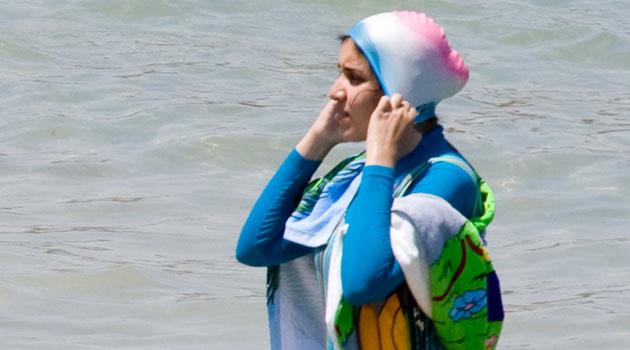Analysis: Burkinis once symbolized happiness and health - why do they now mean terrorism?

Burkini, burkini, burkini. It’s one of the words most used in the Czech language this summer.
Shock! Burkinis have appeared in an aquapark in Prague!
In the Czech town of Litoměřice the mayor has banned them outright, even though none have ever been seen there. A reporter for news server iDNES.cz wore one to Lake Máchá in the Czech Republic to do one of the most-followed investigative reportages in modern Czech journalism.
Last summer in France the first fines ever were handed down against Muslim women for wearing burkinis. A ban on this swimwear has been issued by several French coastal summer resorts.
The reason given there is that burkinis allegedly are ostentatious manifestations of affiliation with Islam at a time when France has been subjected to attacks by terrorists who are of that religion. Last Friday, however, the state council that performs the role of the country’s highest administrative court halted the ban on wearing burkinis on beaches at one of those resorts because, in its view, the prohibition gravely and obviously illegally violated fundamental freedoms.
Burkinis have now become a symbol. That French state council has issued a preliminary injunction only for the time being, and a decision on the merits is in the process of being released.
The ban on burkinis in France was issued for security reasons, to protect public order and a secular French society, because the swimwear can also be used to demonstrate support for terrorist movements. Some French people say they consider burkinis unacceptable for hygienic reasons as well, not just for those who wear them, but also for fish and other swimmers.
Burkinis are also allegedly a reflection of sexist opporession and Islamic enslavement of women, symbolizing Islamic extremism. They are supposed to keep women covered so that it is possible to better control them.
The burkini as a symbol of progress
The burkini was not created by either the Iranian or the Saudi Arabian regimes. It is the creation of a female Austrialian-Lebanese designer, and she says it symbolizes relaxation, happiness and health.
The swimwear is designed for women who want to engage in a very western activity, namely, lying or sitting on the beach and swimming. Burkinis are a relatively new fashion trend because Muslim women who swim are a relatively new trend.
In many Muslim countries women are unable to take advantage of the beauties of the natural world as they desire, and women swimming is considered provocative and shameful. In those countries women cannot go to the beach, not even together with men, and not even if they were to wear a burkini.
The wet fabric of the suit might stick to the woman’s body and show her curves, which is considered shameful in public. Muslim women, therefore, have never before been used to spending a day at the beach or by the pool, where they are now able to meet their friends, at least in some countries.
The ban on burkinis could force Muslim women to have to choose between their national identity and their religion, and also enforces the impression that clothing choice is always a political statement, even when the individuals involved do not intend to communicate any such thing. Muslim women have also been forced to choose between their everyday customs and respect for the law of the state.
Burkinis as a symbol of terror
In France, burkinis are considered a uniform of extreme Islam. This perception originates in the long-secular tradition of the French state.
Since 1905 it has been banned in France to demonstrate affiliation with any religion in public. This prohibition was originally designed to break down the power held by the Catholic Church, but now it is especially Muslims who are coming into conflict with it.
Secularism is meant to guarantee and protect religious freedom. In France, however, this protection of religious freedom is rather becoming protection of an absence of religion in public.
Burkinis are also condemned by many feminists because they allegedly reflect women’s enslavement, which is not compatible with French values. They represent an archaic vision of the place of a woman in society and of the relationship between men and women.
Burkinis, in the feminist view, are not just a matter of women’s swimwear. They are a symbol of a political direction that is hostile both to diversity and to women’s emancipation.
Fashion as a barometer
The right of a woman to choose her own swimwear has prompted controversy for more than a century now. In 1907 a female swimmer was arrested in the USA for wearing a one-piece swimsuit that did not cover her shoulders.
That attire was considered so “obscene” that the court allowed it only to be worn together with a raincoat that could be removed only when the body was completely submerged in the water. During the 1950s bikinis attracted big attention because they were said to reveal too much of women’s bodies.
Two-piece swimsuits were subsequently banned in Italy, Portugal and Spain. In 1967 four Parisian women wearing miniskirts were assaulted by a crowd because the sight of them allegedly “provoked” a group of butchers from Les Halles market.
Fashion has always been a reliable barometer of social change. Each attempt to ban it has been inspired by hidden fears of equality among the sexes, modernity per se, and women’s emancipation.
Arab dress codes
Arab countries also have their own dress codes for swimmers, which depend on the degree to which tourism is developed in a particular location. In Oman or the United Arab Emirates it is not possible to wear swimsuits anywhere other than on the beach or by the pool.
Here we should note that even in western countries wearing nothing but a swimsuit with no body of water in the immediate vicinity is also considered a sign of boorishness. In the emirate of Sharjah, however, women cannot wear swimsuits on public beaches at all, which means that they can only swim when absolutely covered.
In Jordan, women are not supposed to go outside with wet hair, because it allegedly indicates their sexual availability, and it is preferred that they wear shorts and a t-shirt over their swimwear. It is possible to wear bikinis only at the most exclusive resorts there.
Inspiration from the mullahs
The basis of a free society is an acceptance of others’ right to live in accordance with a faith that some of us do not share as long as those people also accept everybody’s else’s freedom. We do not all have to hold the same faith in order to live together.
Strong societies, naturally, cannot allow the existence of parallel legal or political systems such as sharia law, for example. These societies, however, must be able to deal with differences in clothing and customs.
These societies can ban religious symbols as disruptive to the courts or schools, but burkinis pose no threat to western civilization. France, by banning burkinis, set off on the path of becoming a regime where only that which is specifically prescribed by law is allowed.
The ban on burkinis would advance this illiberal trend even further by banning the wearing of religious symbols even in private. What might follow from such a ban?
Would France set up a special police force to supervise public secular morals, like those that already exist in the countries run by mullahs? France would choose an absolutely paradoxical model in that case.
The state would like to tell Muslim women what to wear because it does not want their religion to tell them what to wear. In the name of expanding freedoms for Muslim women, it would deny them the right to choose their own clothing.
Burkinis demonstrate that Muslims are not yet integrated
Burkinis spark tensions in society because they demonstrate that Muslims are not fully assimilated. They show that Muslim women are not assimilated to the degree that public opinion would like.
That raises the question of whether being a “proper” French Muslim woman means never displaying signs of your faith. Moreover, the absence of such integration is considered a very serious problem in France.
Along with insufficient education, social exclusion and unemployment, lack of inclusion is considered a contributing factor to the rise of jihadism there. The only option for resolving this conflict is to begin a debate about what exactly assimilation and integration mean and to what extent a society that does not want to disrupt its cohesion should allow diversity to develop.
First published in Czech on HlidaciPes.org.
